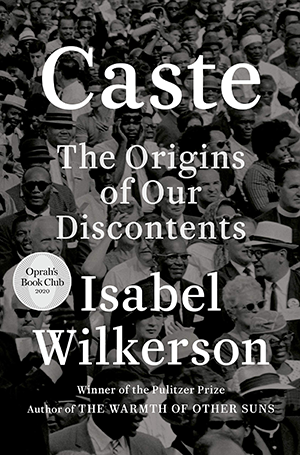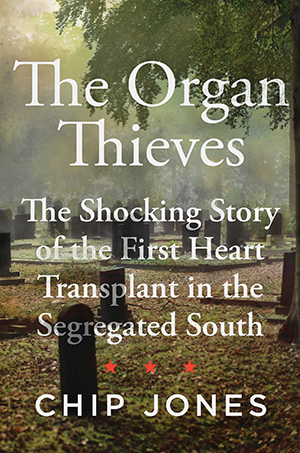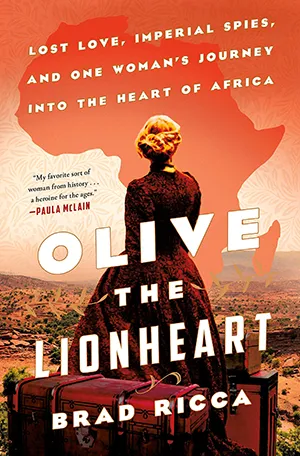The Forged Gospel of Jesus’s Wife, Hidden Castes and Other New Books to Read
These five August releases may have been lost in the news cycle
/https://tf-cmsv2-smithsonianmag-media.s3.amazonaws.com/filer/21/50/21502ea9-70a1-4b7c-8bb0-ee6952acc3b4/booksweek10.png)
Nine years after Dan Brown’s The Da Vinci Code popularized the theory that Jesus was married to Mary Magdalene, Harvard historian Karen L. King announced the discovery of a 1,600-year-old papyrus that seemingly supported the much-maligned novel’s premise. The 2012 find was an instant sensation, dividing scholars, the press and the public into camps of non-believers who dismissed it as a forgery and defenders who interpreted it as a refutation of longstanding ideals of Christian celibacy.
For a time, the debate appeared to be at an impasse. But in 2016, journalist Ariel Sabar—who’d previously reported on the fragment for Smithsonian magazine—published an investigation in the Atlantic that called the authenticity of King’s “Gospel of Jesus’s Wife” into question. Shortly after, King publicly stated that the papyrus was probably a forgery. In a book published this month, Sabar zooms out to present the full accounting of what happened with the artifact.
The latest installment in our series highlighting new book releases, which launched in late March to support authors whose works have been overshadowed amid the COVID-19 pandemic, explores Sabar’s research, a searing examination of caste systems across the world, a 20th-century Scottish aristocrat’s search for her missing fiancé, the end of the universe and the first heart transplant performed in the Jim Crow South.
Representing the fields of history, science, arts and culture, innovation, and travel, selections represent texts that piqued our curiosity with their new approaches to oft-discussed topics, elevation of overlooked stories and artful prose. We’ve linked to Amazon for your convenience, but be sure to check with your local bookstore to see if it supports social distancing-appropriate delivery or pickup measures, too.
Veritas: A Harvard Professor, a Con Man and the Gospel of Jesus’s Wife by Ariel Sabar

Sabar’s investigation of the Jesus’s wife papyrus spanned more than seven years, from fall 2012, when he was the only journalist in attendance at King’s public announcement of the find, to spring 2016, when he confronted the amateur Egyptologist–turned–pornographer likely responsible for the forgery, and fall 2019, when he conducted final interviews for his in-progress book. Veritas presents the full story of this venture for the first time, drawing on information garnered from more than 450 interviews, thousands of documents, and trips across the country and the world.
Two central figures dominate Sabar’s work: King, the Harvard historian who professed the papyrus’ importance as a testament to diverse voices in the early Christian church, and Walter Fritz, the book’s eponymous “con man.” Deemed an “eel” by an acquaintance, Fritz’s larger-than-life experiences included stints as the director of a museum dedicated to the East German secret police, an auto-parts executive and an internet porn star.
The author takes care to “portray King in a positive, compassionate light,” according to Kirkus’ review of Veritas, but stresses his belief that her “ideological commitments” guided her practice of history. “The story came first; the dates managed after,” he writes. “The narrative before the evidence; the news conference before the scientific analysis; the interpretation before the authentication. Her rich sense of what Christianity might be—if only people had the right information—too often preceded the facts.”
Ultimately, Sabar concludes, King viewed the papyrus “as a fiction that advanced a truth”: namely, that women and sexuality play a larger role in Christianity than previously acknowledged.
Caste: The Origins of Our Discontent by Isabel Wilkerson

Deemed “an instant American classic” by New York Times critic Dwight Garner, Isabel Wilkerson’s Caste counts Oprah Winfrey among its most ardent supporters. The talk show host was so impressed with the work, in fact, that she sent 500 copies of it to governors, mayors, CEOs and college professors across the country.
As Wilkerson explains to NPR’s Terry Gross, Caste argues that divisions and rankings ingrained in America’s infrastructure underlie “much of the inequality and injustices and disparities that we live with in this country.” A more accurate term for the United States’ systemic oppression of black people is “caste system,” not racism, says the Pulitzer Prize–winning author.
Wilkerson—who previously garnered praise for The Warmth of Other Suns, a study of the Great Migration—identifies “eight pillars” present in three of the most egregious caste societies: the U.S., India and Nazi Germany. Among others, the list includes divine will, heredity, dehumanization, terror-derived enforcement and occupational hierarchies. Dividing people into categories ensures that those in the middle rung have an “inferior” group to compare themselves to, the author notes, and maintains a status quo with tangible ramifications for public health, culture and politics.
“The hierarchy of caste is not about feelings or morality,” Wilkerson writes. “It is about power—which groups have it and which do not.”
The End of Everything (Astrophysically Speaking) by Katie Mack
/https://tf-cmsv2-smithsonianmag-media.s3.amazonaws.com/filer/bc/a4/bca470c8-4552-4c55-b2e9-ff94f7db43aa/end_of_everything.png)
Katie Mack “makes speculating about the death of the universe unexpectedly entertaining,” says Kirkus in its review of the astrophysicist's debut book. Penned in accessible, often humorous prose, The End of Everything explores five possible ways in which life as we know it could draw to a denouement: the Big Crunch, Heat Death, the Big Rip, Vacuum Decay and the Bounce.
The first of these would unfold much “like a ball thrown up in the air that then comes back down,” according to the New York Times’ James Gleick, while the second—and most likely scenario—would be a slower demise marked, writes Mack, “by increasing isolation, inexorable decay and an eons-long fade into darkness.”
Speaking with BBC News’ Kameron Virk, Mack offers a glimmer of hope to terrified readers, noting that in all likelihood, the universe won’t end for “trillions and trillions and trillions and trillions of years and so on.”
Still, she adds, “Technically, it could happen at any time.”
The Organ Thieves: The Shocking Story of The First Heart Transplant in the Segregated South by Chip Jones

Billed by its publisher as The Immortal Life of Henrietta Lacks meets Get Out, Chip Jones’ new book catalogs the little-known story of Bruce Tucker, a black factory worker who was admitted to Virginia’s top research hospital after sustaining a head injury in May 1968. The following day, surgeons removed the “neurologically dead” patient’s heart and transplanted it into a white businessman, who died one week later. Tucker’s family, who had been neither consulted on nor informed of the unauthorized procedure, only found out about it when a funeral home director told them that their loved one’s heart and kidneys were missing.
Determined to understand what had happened, Tucker’s brother hired attorney (and future Virginia governor) Doug Wilder to mount a wrongful death lawsuit. According to a contemporary account in the New York Times, Wilder argued that Tucker’s doctors had “engaged in a ‘systematic and nefarious’ scheme to use Bruce Tucker’s heart and hastened his death by shutting off the mechanical support systems.” The defense, meanwhile, maintained that because Tucker’s brain had shown no activity for several hours prior to the operation, he was considered legally dead.
Though the all-white jury ruled in the transplant team’s favor, Publisher’s Weekly notes that the group intended to find the hospital negligent for operating without the Tucker family’s consent and only failed to do so due to a statute of limitations.
The Organ Thieves’ author, Pulitzer Prize–nominated journalist Jones, pieced together Tucker’s story through “years of research and fresh reporting,” per the publisher. The result, writes Publisher’s Weekly, “is a dramatic and fine-grained exposé of the mistreatment of black Americans by the country’s white medical establishment”—a trend exemplified by Lacks’ “immortal cells,” the Tuskegee syphilis study and the numerous surgeons who honed their craft by operating on enslaved women, among other instances of exploitation.
Olive the Lionheart: Lost Love, Imperial Spies, and One Woman's Journey into the Heart of Africa by Brad Ricca

When Scottish socialite Olive MacLeod learned that her fiancé, naturalist and British Army officer Boyd Alexander, had gone missing in Africa in 1910, she decided to search for him herself. Accompanied by a married English couple who “were more seasoned travelers,” according to Publisher’s Weekly, she trekked 3,700 miles in nine months, undertaking such adventures as crossing Lake Chad in a canoe, climbing the Hajer-el-Hamis peaks barefoot and adopting a pair of lion cubs. Upon reaching Maifoni, in what is now Nigeria, MacLeod finally learned her beloved had been killed—and how the competing colonialist forces of Great Britain, Germany and France had contributed to his violent demise.
Like author Brad Ricca’s 2017 book, Mrs. Sherlock Holmes, Olive the Lionheart presents an immersive portrait of a remarkable, largely unheralded individual. As the author writes, Olive has long been portrayed “as a lovestruck, heroic young woman of superhuman ability.” By drawing on her own accounts of the journey, as recorded in diaries, letters and published writings, Ricca emphasizes MacLeod’s transformation into “a noted explorer, archaeologist and photographer in her own right,” says Kirkus.
/https://tf-cmsv2-smithsonianmag-media.s3.amazonaws.com/accounts/headshot/mellon.png)
/https://tf-cmsv2-smithsonianmag-media.s3.amazonaws.com/accounts/headshot/mellon.png)